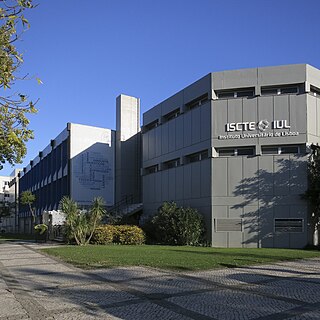Related Research Articles

The University of Trás-os-Montes and Alto Douro is a public university located in the north-eastern city of Vila Real, Portugal.

Coimbra is a city and a municipality in Portugal. The population of the municipality at the 2021 census was 140,796, in an area of 319.40 square kilometres (123.3 sq mi). The fourth-largest agglomerated urban area in Portugal after Lisbon, Porto, and Braga, it is the largest city of the district of Coimbra and the Centro Region. About 460,000 people live in the Região de Coimbra, comprising 19 municipalities and extending into an area of 4,336 square kilometres (1,674 sq mi).

The University of Lisbon is a public research university in Lisbon, and Portugal's largest university. It was founded in 1911, but the university's present structure dates to the 2013 merger of the former University of Lisbon (1911–2013) and the Technical University of Lisbon (1930–2013).

The Federal University of Rio Grande do Sul is a Brazilian public federal research university based in Porto Alegre, Rio Grande do Sul. UFRGS is among the largest and highest-rated universities in Brazil, having one of the largest number of scientific publications. From 2012 to 2019, the university was elected as the best federal university of Brazil. UFRGS has over 31,000 undergraduate students, over 12,000 graduate students, and more than 2,600 faculty members. As a Brazilian public federal institution, students do not pay tuition fees to enroll in courses offered by the university.

Polytechnic of Porto - School of Engineering (ISEP) is a public polytechnic higher learning and research engineering institute, located in the city of Porto, Portugal. ISEP is divided into eight departments, with an emphasis on applied science and technology.
The Polytechnical Institute of Lisbon(Instituto Politécnico de Lisboa) is one of the biggest state-run polytechnic institutes in Portugal. It was founded in Lisbon in 1985, being composed by several higher education institutes and schools, some of them with a longer history. In total, 12,933 students were enrolled on all schools for the 2007-2008 school-year.
The Polytechnical Institute of Coimbra is a public polytechnic institute of higher education in Coimbra, Portugal. It was created by decree of 1979, but its effective start up was only in 1988 through the creation and union of new and former schools. With an enrollment of 10,197 (2008) students, it is the third biggest polytechnic institute of Portugal.

The Federal University of Itajubá, is a federal university located in the state of Minas Gerais, Brazil. It is considered the first technological university and one of top ten engineering schools in Brazil. Extremely reputable among Brazilian engineering schools, it carries more than 100 years of tradition in teaching, with emphasis on Electrical Engineering – which is one of the best research institutes on Power Systems field in Latin America – Mechanical Engineering, Environmental Engineering, Materials Engineering, Automation and Control engineering and Computer Engineering.
The Polytechnical Institute of Beja is a state-run polytechnic institute of higher education, comprising several schools. It is located in Beja, on the south region of Alentejo, Portugal. It was established in 1979 and has about 35,000 students.
Higher education in Portugal is divided into two main subsystems: university and polytechnic education. It is provided in autonomous public and private universities, university institutes, polytechnic institutes and higher education institutions of other types.

Science and technology in Portugal is mainly conducted within a network of research and development (R&D) units belonging to public universities and state-managed autonomous research institutions. There are also non-state-run research institutions and some private R&D projects developed by companies.
The University of São Tomé and Príncipe, USTP, is a public institution of higher education in São Tomé and Príncipe. It is the main institution dedicated to teaching, research and university extension of the country. It was established in 2014 by merging three older institutions of higher education: ISP, EFOPE and ICS.

The University of Cape Verde is the only public university of Cape Verde. The main campus is in Palmarejo, Praia, but there are also institutes in Mindelo, Assomada and São Jorge dos Órgãos. It has over 5000 students. A new campus for Uni-CV is under construction in Palmarejo, financed by the Chinese government. It should be completed by July 2020. It will have capacity for 4,890 students and 476 professors, with a library, dorms, cafeterias and sports facilities. It will have 61 class rooms, five auditoriums with a capacity of 150 seats, eight computer rooms, eight reading rooms and 34 laboratories.
Polytechnic is one of the two sub-systems of higher education of Portugal, the other being a university education. The polytechnic higher education focuses on providing more practical trainings and profession-oriented, while university education has a strong theoretical basis and highly research-oriented. Polytechnic institutions only grant licentiate's and master's degrees, as opposed to universities granting doctor's degrees.

ISCTE – IUL is a Portuguese public tertiary education institution. It is located in the city centre of Lisbon, in Cidade Universitária, adjoining the Institute of Social Sciences (ICS) and Institute of Geography and Spatial Planning (IGOT) of the University of Lisbon. ISCTE was founded in 1972, starting with three degrees and 296 students. Formerly called Instituto Superior de Ciências do Trabalho e da Empresa, its full name was dropped in 2009 when it became a university institute of foundational nature.
The Polytechnic Institute of Viana do Castelo is a state-run polytechnic institute of higher education in Portugal. Its five schools are located in several cities of the Viana do Castelo district in Portugal. It was established on 16 August 1980.

António Fernando de Vasconcelos Nogueira is a Portuguese philosopher, Social Science researcher, author, dramatist, and freelance journalist.

The University of Lisbon was a public university in Lisbon, Portugal. It was founded in 1911 after the fall of the Portuguese monarchy and was later integrated in the new University of Lisbon along with the former Technical University of Lisbon.
References
- ↑ "Big is beautiful for merging universities". BBC News. 2015-11-25. Retrieved 2024-11-10.
- ↑ "Technical University of Lisbon". tethys-engineering.pnnl.gov. Retrieved 2024-11-10.
